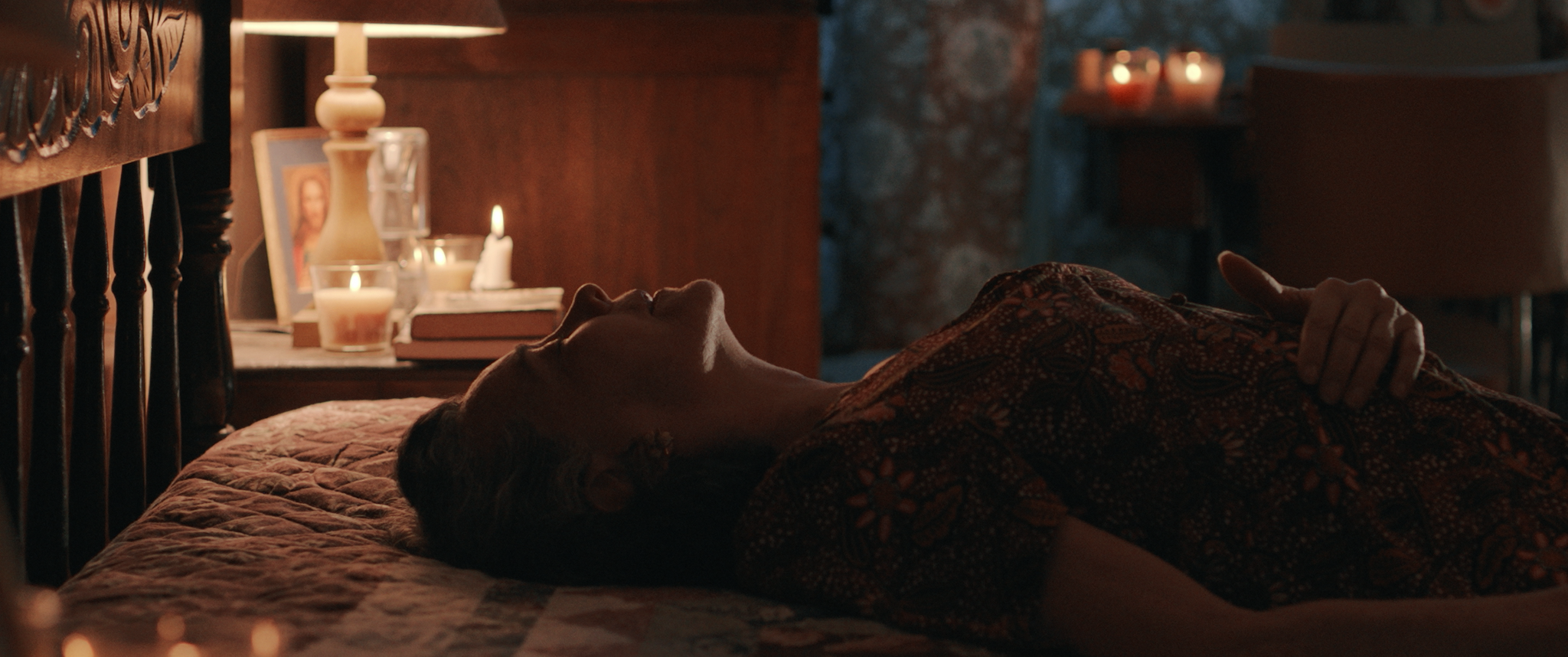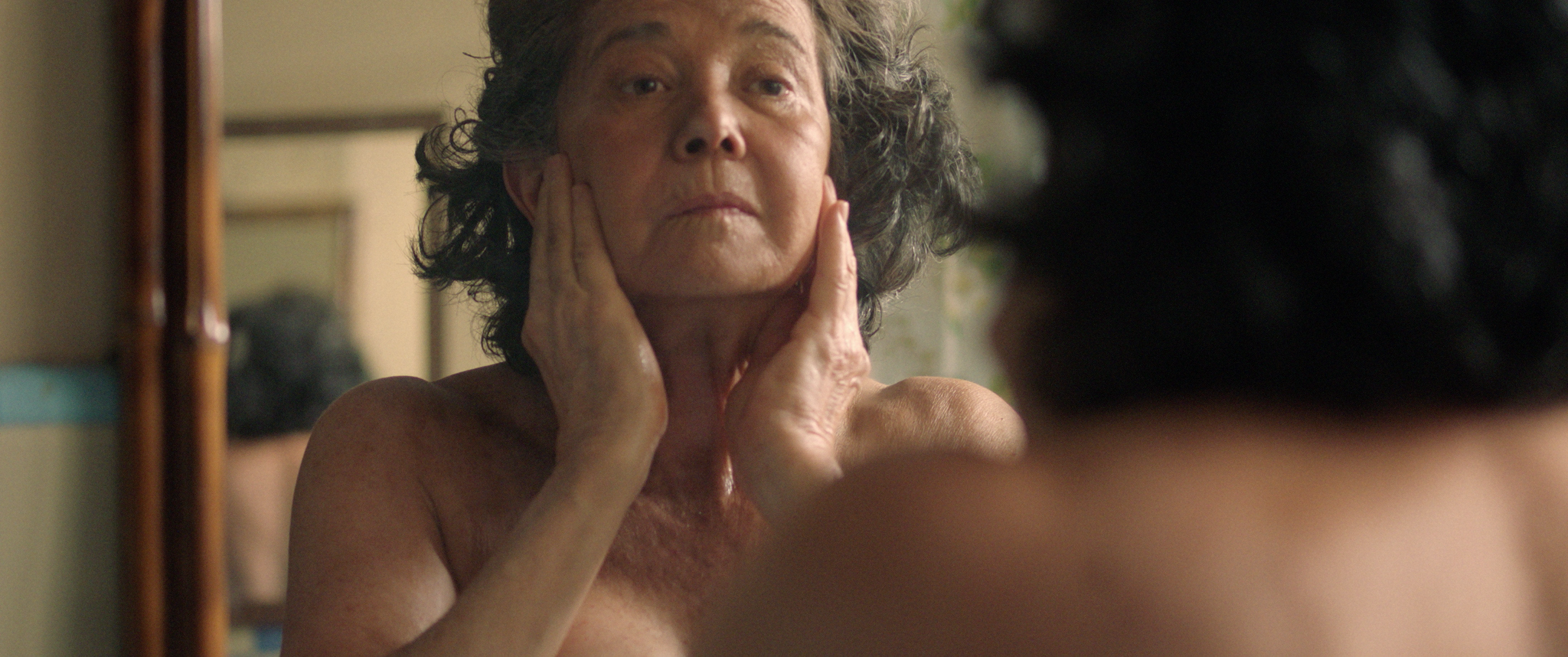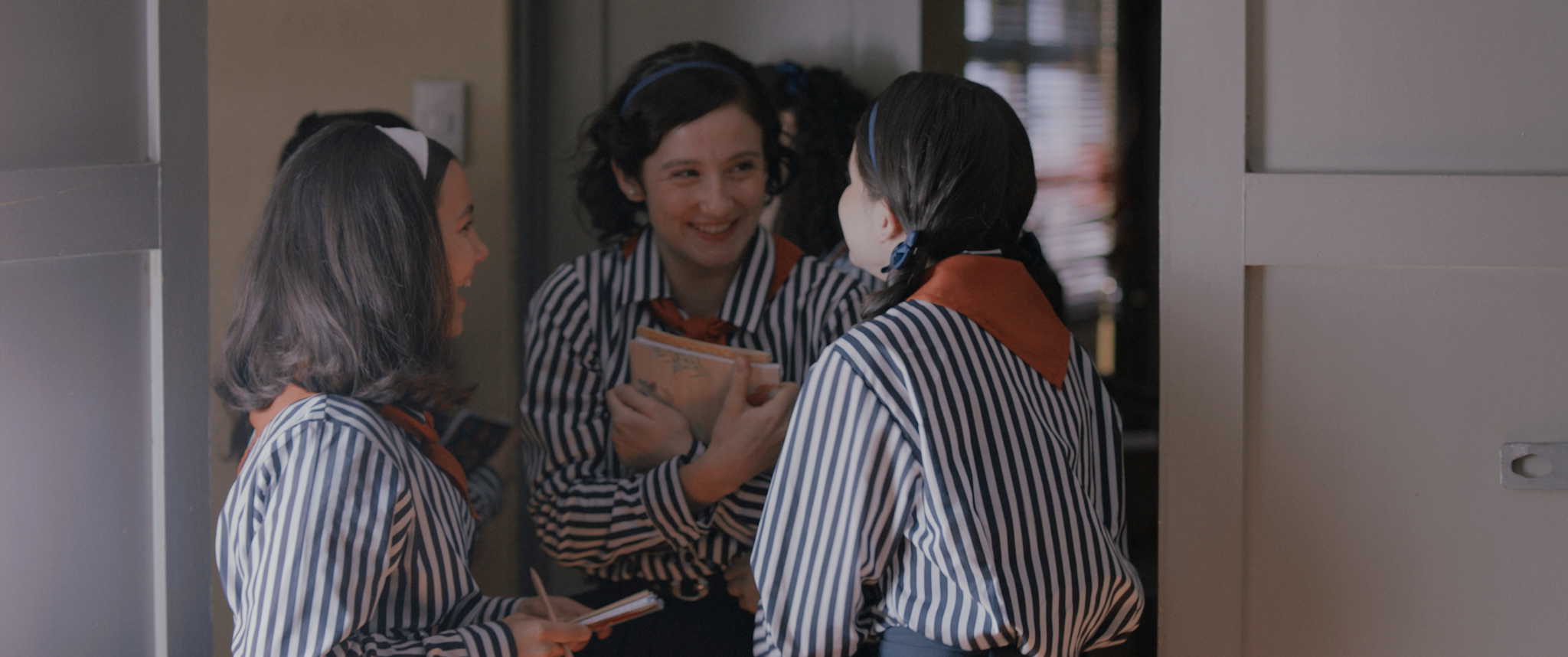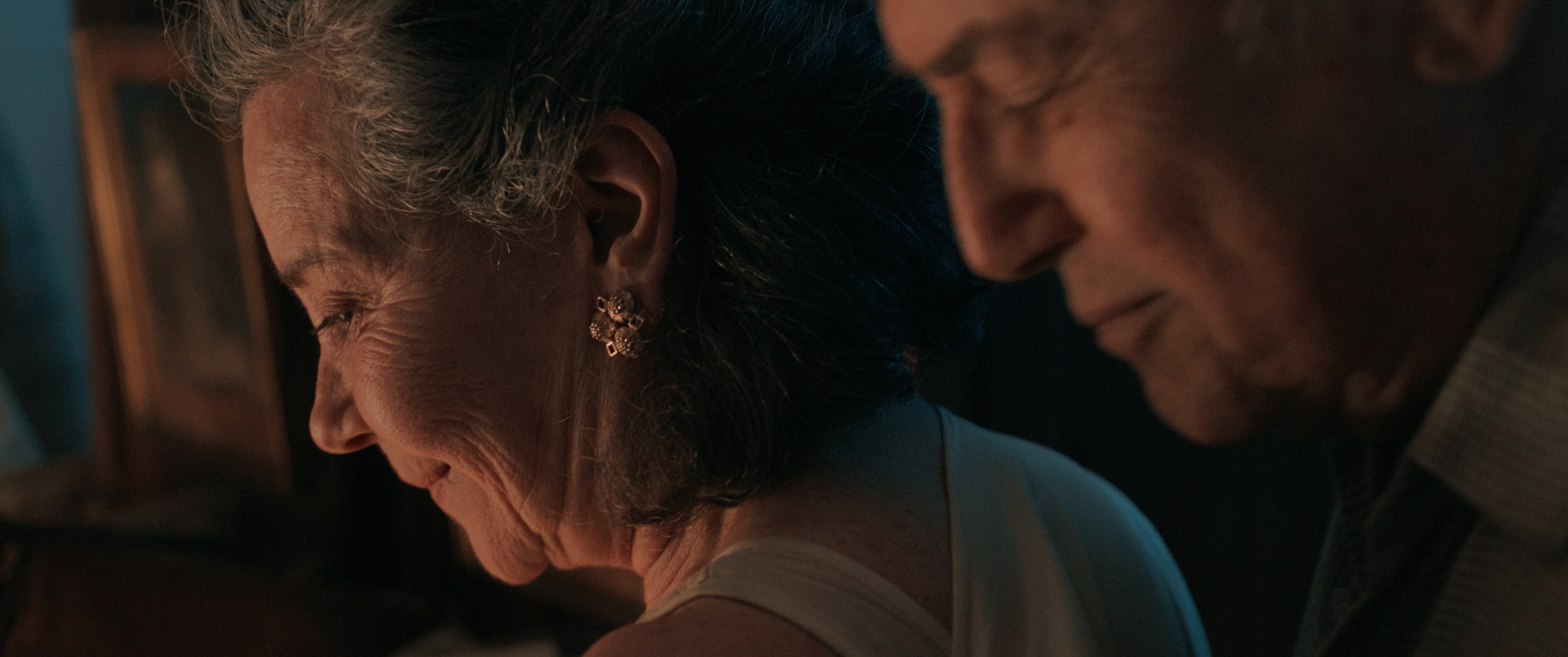

The director discusses Memories of a Burning Body, her intimate and transportive new feature.
“Sex was like a black hole. It didn’t exist, but it swallowed you,” a woman confesses in Antonella Sudasassi’s Memories of a Burning Body. Weaving together the voices and stories of eight anonymous Costa Rican women in their seventies and eighties, the director’s prismatic second feature contains many similar moments that illuminate an enduring paradox: that especially for women, sex is both everywhere, but must be repressed; and that as a site for pleasure and violence alike, it is tainted with shame.
“It seems that our vital energy as human beings is being absorbed,” Sudasassi responds when I bring up this arresting image of the black hole. “Sex is something we need to survive. It’s so instinctive, but so prohibited. We’re pulled towards this black hole, but we don’t seem to talk about what it means for us as human beings—and we don’t see it as natural, the way it should be seen.” Memories of a Burning Body, in a formally inventive and emotionally resonant cinematic flourish, allows the recollections of Sudasassi’s interviewees to coalesce in the body of one woman, who we watch relive these memories, reenacted in the space of her house. Intimate and transportative, these braided reflections on sexuality across girlhood, adolescence, marriage, and old age drift organically—as is the nature of memory—from one corridor to another.
“I think the film gives words to people that have never talked about sex, but have always had a relationship with sex,” the director says. Below, she discusses the inherent politicisation of women’s bodies and sexuality, crafting her film’s unique structure, and what we can learn from an older generation of women determined to live lives of passion and pleasure, even after facing immense violence.
Xuanlin Tham: The film’s title captures both pain and desire, both trauma and a vivid sense of being alive. What does this image signify to you?
Antonella Sudasassi: One protagonist [I interviewed] told me that a woman’s body has a fire that doesn’t extinguish. That image of having fire inside, out of anger, but also feeling alive until your last breath, really shocked me, because we tend to think of our elders like their life is already behind them. This idea of being alive until the last moment, that it’s never too late to enjoy your life, really captured the sensation I had while talking to them—I had an interviewee who, even in her eighties, was studying to be a lawyer.
XT: Your first film, Awakening of the Ants, also explored the everyday textures of a woman’s life and sexuality. What is it about cinema that you find particularly powerful for this exploration?
AS: I love cinema because it’s like seeing something you feel so far away from through a magnifying glass. When I was growing up, having sexual desire as a woman was seen as a sin. It was something taboo, especially in Catholic societies like Costa Rica. With Memories of a Burning Body being based on real voices of women, it made me connect so much—I only hoped to transmit that to the audience. You might have already known these were their stories; you assume they lived through a lot of violence. But there’s a strength in hearing them: in having people that are older, that have such a problem talking about these subjects, talking about it on the screen, for the screen.
XT: The repression of women’s sexuality is linked to ensuring they provide the reproductive labour to sustain capitalism. How did you balance this film being both an intimate piece of art, but one that tells a broader political story?
AS: There’s something formal [in the film]. Because I had to respect the intimacy of these women, I didn’t include any personal details. By intertwining their stories, I somehow told the story of no one. It’s a private story, but also a story that represents many. Female sexuality is absolutely politicised. I read an opinion piece in The Guardian which said anti-feminism won the election in the US, and that synthesises the hate that exists worldwide towards women owning themselves. In Afghanistan, women cannot no longer talk to each other: it’s prohibited by law. In the US, it made a shift in the election. In a humble way, this film tries to go through the memories of these women, remember our past and how we arrived where we are, so we don’t forget.

Memories of A Burning Body (dir. Antonella Sudasassi, 2024)
XT: The trauma these women endured still happens today: a collapse of time, a rejection of linear progression, that your film captures by bringing the past and the present together within the space of this house. Could you tell me about creating this space?
AS: One of the women told me, and this is in the film, that “time is not linear. It’s like a bubble.” That inspired the mise-en-scène of the film. I love this idea that even if [the women] no longer have much to do, they have no time. This protagonist told me, “I live more and more in my memories.” That idea of reliving your memories like they inhabit your space, they coexist in your present, translated into the mise-en-scene. Actors from the past appear as she touches something, because that brings up the memory. When you rethink time as a bubble, everything happens at the same time.
The house, for the women that I talked to, represented their dream when they were kids: to become a housewife, a mother. The house was a space that they wanted to build. But that house also became- let’s not say a prison, but a space of limitation. That’s why I decided with my team to do everything in the same house.
XT: In the beginning, we see your camera reflected in the mirror, and the clapperboard commencing actress Sol Carballo’s transition into character. What was the significance of these shots?
AS: When I shared the script before filming, people gave me feedback that the audience might feel deceived somehow, because it’s not a documentary, and not fiction. There was a need to reinforce that what they’re hearing is real, but what they’re seeing is not. So I came up with this idea of doing this first shot all in one take. I love that reality becomes fiction, but fiction is actually reality, because we’re hearing real voices.
XT: How did you originally meet your interviewees?
AS: I started looking for women that live very different experiences. I started talking to one that was already married, never remarried after being a widow. And another one that was absolutely the opposite: she was liberal, she got divorced, she got involved with women, and had a very different concept of sexuality. I talked to a person that lived on the streets, and who had all her pregnancies in jail. I realised they shared a lot of the feelings they experienced when they were giving birth, had their first period, got married, had their first sexual experience. Even if one was surrounded by big houses and the other was in complete poverty, the sensations they experienced were similar. That’s when I came to the idea of intertwining their stories.
The film has won audience awards in different cultures, in Berlin, in France, in Korea—and it strikes me that the women who come out of the cinema more impressed are younger women that have never experienced what we see on screen, but feel like it’s part of their story. I’ve never—knock on wood—experienced strong sexual violence as we recall in the film, but somehow I feel it in my blood, like it’s part of my past. It’s intriguing that women from many different countries relate.

Memories of A Burning Body (dir. Antonella Sudasassi, 2024)
XT: I’m fascinated by the way we label many things and films ‘feminist’ nowadays, sometimes to the detriment of that term’s power. I’m interested to know what your relationship to that term is.
AS: I never pursued doing a feminist film. After finishing my first feature film, I had this sense, meeting with the audience, that there was a lot to be said by older women. This was an opportunity to talk about their experience, about violence against women. Is that feminist? It was their life experience that they’re sharing, not a political stand. I’m a complete feminist. I cannot think otherwise, and I decide as a director, as a screenwriter, what to include and what not to include in the film. I truly cannot understand why people think some people are better than others. Does that make me a feminist? Well, let it be.
XT: What has been the most lasting discovery for you, having embarked on this exploration with these women?
AS: I was really surprised about how much violence I encountered in their stories. It’s awful. Showing the film in Costa Rica, there were so many people that told their own experiences during the Q&As, and many of them were violent stories. But what really surprised me, in such a beautiful way, was their will to live. Seeing them in their eighties, falling in love, letting themselves dream of projects for the future… when you’re young, you tend to think there’s an expiration date. Seeing them so alive makes me rethink my life.

Memories of A Burning Body (dir. Antonella Sudasassi, 2024)
XT: The whole film discusses sex, but you also stage a depiction of a confusing wedding night. Could you tell me about this sex scene?
AS: I heard so many horror stories. I was always wondering, what’s this film about? Is it a film about sexual violence? I made a huge effort to include humorous stories, because if you only talk about violence, it’s so straining that you cannot connect, and I wanted people to really empathise. This anecdote in particular was so hilarious: having sex and asking at the end, “Are you sure [you did] it in the right place?” [laugh]
XT: Carol Vance wrote in the 1980s that “sexuality is simultaneously a domain of restriction, repression, and danger, as well as a domain of exploration, pleasure, and agency.” To end on a hopeful note – like your film does – where do you think the possibility of liberated sex lies?
AS: It’s a very complicated question, but the only thing I can think of is respect. Because if I like something, it doesn’t mean you have to like it. This woman in particular told me she didn’t believe in feminism, and that she was not a feminist. But then she comes out and says, “We should consider ourselves humans”. The last phrase she says is, “How difficult it is to understand that we’re not a woman, not a man, we’re just human beings.” We all have different conceptions of life, love, sex, sexuality, joy, pleasure, desire. We don’t have to think the same. We just have to respect each other.
Memories of a Burning Body is out now in UK cinemas.





